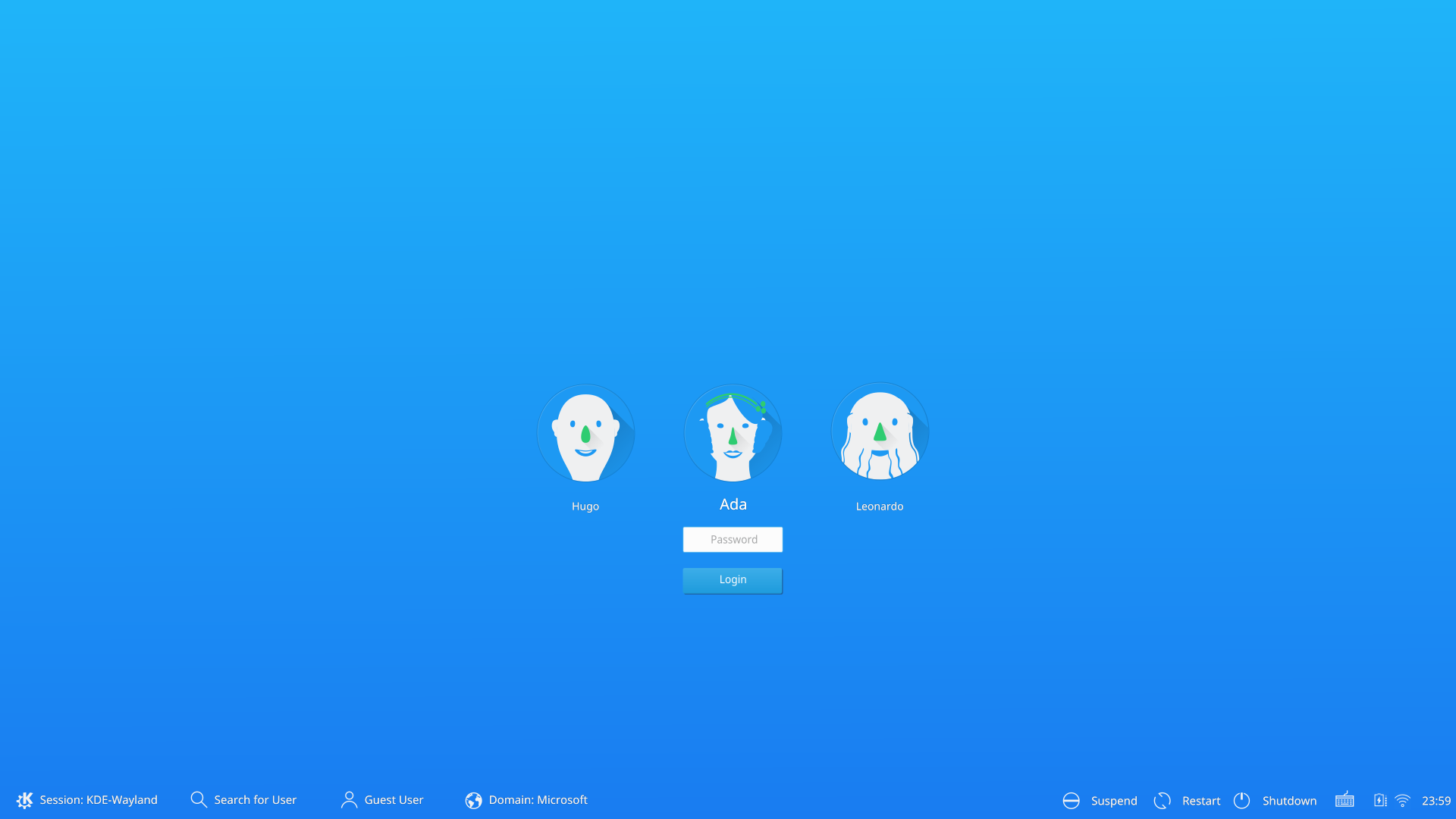KDE Visual Design Group/Unified Login: Difference between revisions
No edit summary |
|||
| Line 44: | Line 44: | ||
*[https://techbase.kde.org/Projects/Usability/HIG/Patterns/CommandPatterns#Patterns_for_a_simple_command_structure Command pattern for a simple command structure]: '''Direct manipulation of content'''. No menu buttons, context menu or context panel. | *[https://techbase.kde.org/Projects/Usability/HIG/Patterns/CommandPatterns#Patterns_for_a_simple_command_structure Command pattern for a simple command structure]: '''Direct manipulation of content'''. No menu buttons, context menu or context panel. | ||
==Layout Design== | ==Layout Design== | ||
===LoginScreen=== | |||
==Implementation Targets== | ==Implementation Targets== | ||
[[File:LoginScreen.png]] | |||
Revision as of 10:31, 1 February 2016
Concept
The current situation with login is one where the previous attempts at unifying the experience fell short and parts become too complex to properly implement. So this work was restarted with mockups from Andreas Kainz, Alex L, Andrea dS and others with the intention of creating one single, simple, unified experience of login from eventual Grub menu, via Plymouth, SDDM login screen, Ksplash and Plasma Desktop.
As KDE gets a new web presence, visual style presence and communication form a unified login experience will be part of that.
Login Vision
Unified Login as a project is intended for computer users who expect that their computer is working as a unified whole instead of different interconnected but isolated parts. Visually it will provide the user with a sense of continuation while still not hiding eventual grub menu, plymouth splash or other details from those more technically adept who may need it.
The ideal scenario is that a user should assume that KDE and Plasma are part of every step in the boot process and be confirmed of that visually during the entire experience.
Personas
(Selected from the pre-defined KDE personas)
- Primary Persona - Susan, 34, recreational user. Susan wants to login to her computer and assume that every part of her computer is part of a larger whole. She wants to feel certain that from the second her computer is turned on her experience and work are all handled by the same system.
- Secondary Persona - Philip, 17, geek. Philip wants to access grub settings and set different kernel boot parameters, he also wants to swap between different users simply. His focus is not as much of the experience of one whole system, but the accessibility of features he feel that he needs.
Scenario
Susan wants to boot her computer and see that it is working and know what to expect of the different aspects. She intends to login, writing in her password and be aware that the computer hasn't crashed or hung during boot. She is happy that her computer visually is similar in all aspects, assuming that the OS she installed is in full control and that there are no empty "hacky" areas. Philip wants to access Grub and add kernel boot parameters to test different ones and how they impact his computers behaviour.
- Main Task - Booting the computer, ensuring a clean boot that displays the state of the boot process.
- Sub-Task - making sure that alternative usage, with access to settings during boot isn't hidden away entirely yet not pressed in the face of users who would not benefit from them.
Organization
Command Structure
Content Structure
The essential commands are:
- Note which option you prefer in the Grub Menu (if Visible)
- Select your preferred option if applicable
- Press enter to select or wait for timer to end
- Access Grub Settings using shortcut or choosing option
- Access Command Line
- Wait for Plymouth to Finish
- Note that your user is pre-chosen in SDDM
- Pick user in SDDM
- Select SDDM language
- Select preferred desktop environment in SDDM
- Type in your password (as the password field should be autofocused) and hit enter or press "Login"
- Note that Ksplash is working and the desktop is loading
- Note that you've reached the Desktop Environment
UI Patterns
- Command pattern for a simple command structure: Direct manipulation of content. No menu buttons, context menu or context panel.

